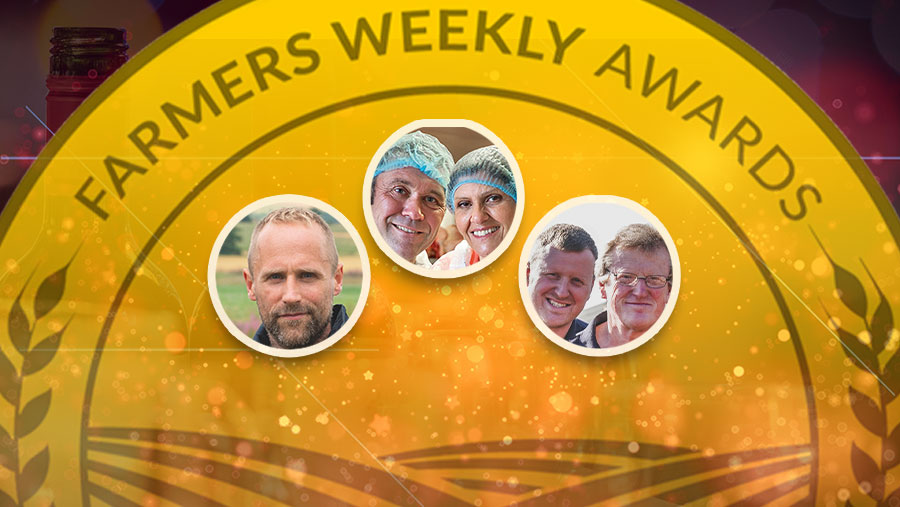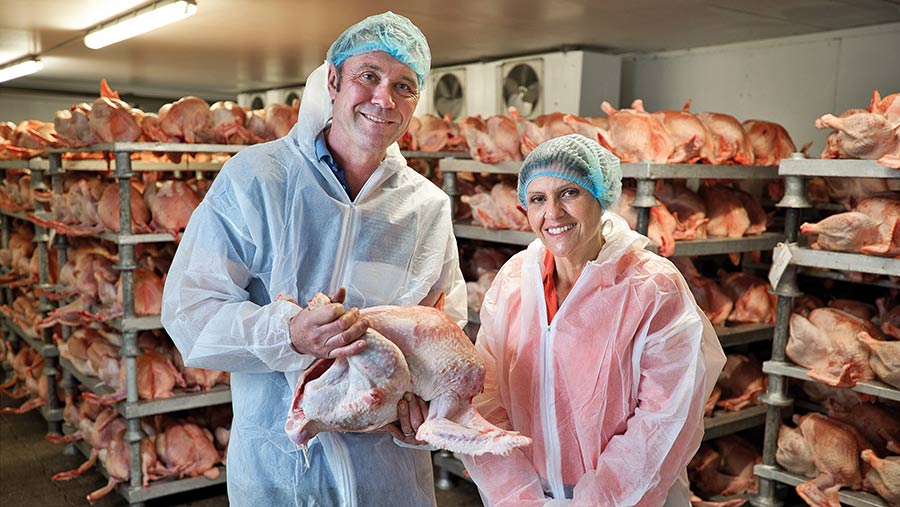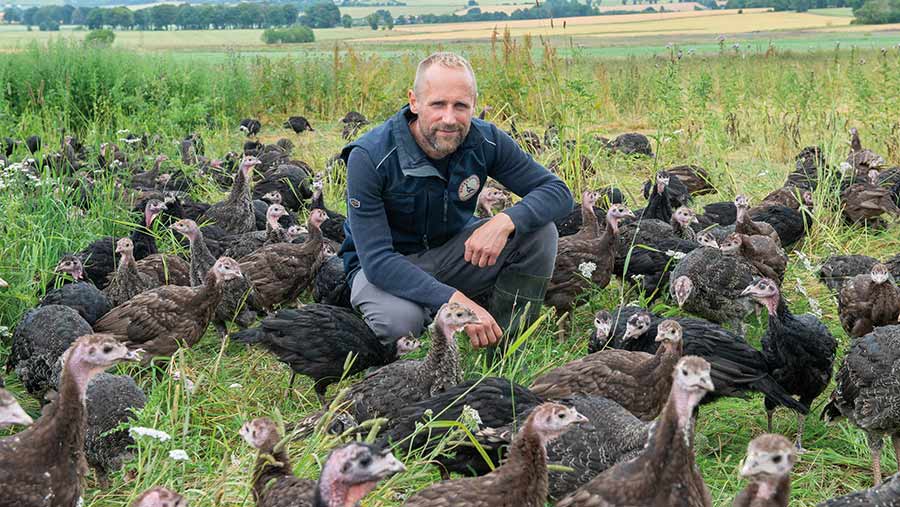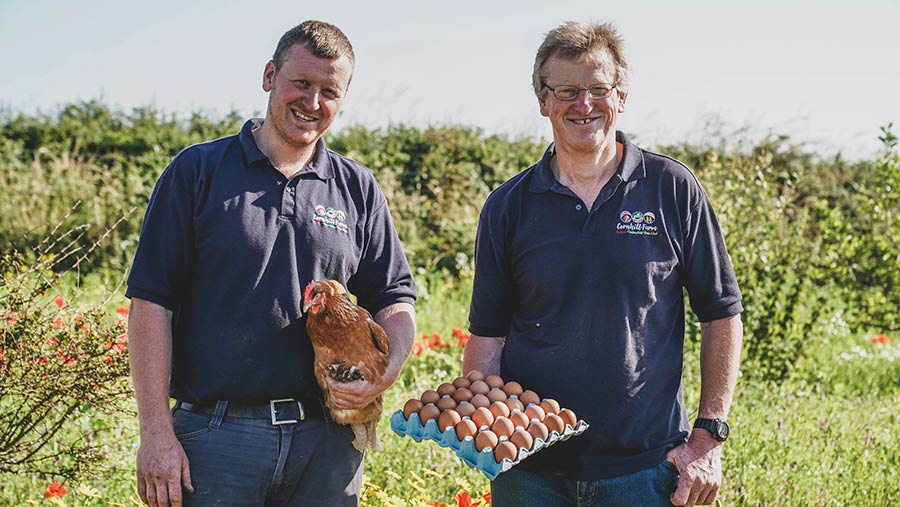Farmers Weekly Awards: 2021 Poultry Farmer of the Year finalists

Eggs and poultrymeat are both represented in this year’s poultry category – with three finalists from all three nations of Great Britain vying for the title of Poultry Farmer of the Year.
The finalists
- Nick and Maria Davis
Usk Vale Poultry, Pontypool, Monmouthshire - Craig Michie
Barra Bronzes, Inverurie, Aberdeenshire - Len and Pete Olds
Cornhill Farm, Camborne, Cornwall
The judges
- Jim and Anne Smillie
Last year’s winners - Philip Clarke
Farmers Weekly executive editor - Aimee Mahony
NFU chief poultry adviser
See also: Farmers Weekly Awards: Pig Farmer of the Year finalists 2021
Nick and Maria Davis
Usk Vale Poultry, Pontypool, Monmouthshire

© Richard Stanton
Turkey production was established at Maesmawr Farm in the early 1990s as a way of bringing Nick Davis back into what was then a small, mixed family farm.
The business has evolved into growing and processing birds, with a primary focus on the Christmas market.
To maintain a year-round income, however, Nick contract-slaughters about 55,000 breeder turkeys for a third party, and processes seasonal turkeys for other local farmers for a fixed fee.
He also supplies a number of London-based customers for US Thanksgiving in November and has a small broiler enterprise.
Business focus
The business is very much focused on serving the wholesale customer, plus a few butchers, with boxed whole birds and various cuts distributed by a third-party haulier across the UK.
“The Christmas trade has continued to grow at a steady pace, which has been achieved through supplying the right product, sensibly priced and on time,” says Nick.
“Butchers and wholesalers, like ourselves, are under immense pressure at Christmas, and as long as you provide this service, you will give them no reason to look elsewhere.”
On past experience, the Davis family are wary of bad debts, so no new customers are taken on at Christmas unless they have traded with Usk Vale for six months, or pay a significant deposit. Credit ratings are checked annually.
There is an emphasis on “buying British” when it comes to inputs. “It is hypocritical to bang the drum that we want the great British public to support our farming industry, and then not reciprocate,” says Maria.
There is a growing emphasis on branding, with Usk Vale boxed turkeys making £1 a head extra margin. But the couple are also happy to provide butcher customers with their own-branded products.
The farm and slaughterhouse host regular customer visits, and Nick has raised the company’s profile, as well as the turkey sector in general, by appearing in the national media.
Technical
Slaughtering and cutting takes place in Usk Vale’s Red Tractor-approved slaughterhouse.
Built in the 1990s, the site has been progressively extended and upgraded as the business has grown, with cold storage added as required.
The processing lines are kept meticulously clean and various innovations have been added, to improve the working environment and the end product – including a high-
frequency stunner to raise bird welfare.
Another development has been the introduction of gas flushing of bagged-up turkeys, which extends the shelf life to six weeks.
This enables processing for Christmas to start in mid-November, making better use of labour. Nick is also in the process of developing an automated crop-removing machine, which would replace two people on the production line.
Turkeys are either barn-reared or free-range, although there are two controlled-environment units at another location.
The emphasis is on getting birds off to a good start through close attention to detail, while the ranges have benefited from extensive tree planting.
Future plans
Nick and Maria aim for continued growth of their business, but with an eye to further diversification to broaden the income stream.
This is likely to include an expansion of their year-round catering turkeys, and may also see more broiler production with another partner.
As labour availability becomes an increasing challenge, further upgrades are planned for the processing lines, while new market opportunities are foreseen in livestock bedding and in turning turkey carcasses into pet food.
What they judges say
Meeting customers’ exacting requirements requires a focused yet flexible approach, and Nick and Maria use their individual skills to make sure everyone gets what they want, when they want. They have an obvious passion for the sector.”
Summary
The judges liked
- Good knowledge of production costs and budgets
- Excellent innovation in the processing line to enhance quality and efficiency
- Strong focus on customer satisfaction, together with attractive branding
- Passion for the business
- Good approach to problem-solving
Farm facts
- 53ha of undulating pasture for free-range turkey growing
- Two environmentally controlled sites off-farm
- 110,000 turkeys reared and 150,000 turkeys slaughtered annually
- Red Tractor-assured slaughter facility
- Two wood-fired biomass boilers, two 50kW CHP units and 120kW of solar panels
The numbers
- 30 Staff working on production line for Christmas sales
- 40% Reduction in straw use since investing in a chopper
- 2 Appearances on BBC Radio 4’s Farming Today programme
- 15% Proportion of birds sold ‘deboned’
- £500k Level of investment set for upgrading the slaughterhouse
- 80% Proportion of electrical requirement produced from renewables
Craig Michie
Barra Bronzes, Inverurie, Aberdeenshire

© Angus Findlay
Based on his parents’ 146ha arable farm in the north-east of Scotland, Craig Michie first got into turkey production in 2013, following an initial career as a town planner.
One of the existing grain sheds on the farm was retrofitted to allow turkey poult rearing, as well as grain storage and processing.
Eight years down the line, the enterprise has steadily expanded. This year, Craig took in some 3,400 poults – all females of various strains of Hockenhull Turkeys – which are spread among four polytunnels on the farm once they have been brooded.
Business focus
The emphasis at Barra Bronzes is on slow-grown birds, with almost 90% now sold direct to the end consumer. “We were averaging £48 a bird sold to butchers and restaurants, compared with £84 a bird to the end consumer, so it makes sense,” says Craig.
To gain the top price and return custom, a huge amount of effort goes into marketing, with Craig making a regular appearance at food fairs, shows and other events.
The bulk of the business is through online sales, so development of the website has been a priority. “The aim has been to make this as relevant as possible in order to score favourably in the Google algorithm, so that we rank on page one when people are searching,” he says.
To achieve this, Craig has developed a learning centre online, which aims to answer customers’ questions about things like storing and preparing their turkey, and how best to cook it.
To make the most of the bird and generate year-round revenue, he has also created his own range of game-hung turkey burgers and sauces, which sell for £7 apiece at events. In 2020, he introduced the Sustainable Bird, offering a 15% discount on turkeys that might have been damaged during processing.
Staffing is another issue commanding attention, with Craig teaming up with a local fruit grower to share resources.
Technical
Getting the poults off to a good start is crucial, says Craig, which means plenty of light, ventilation and stimulation, and regular checks. Birds are weighed every week and only female birds are reared, as they offer better taste.
Great emphasis is placed on the diet, using ingredients that are primarily grown on the farm.
“As well as a cost saving of about £100/t, this enables us to market our birds as low in food miles,” he says.
About 30% of the feed is oats, giving the carcass a creamy finish. It is also high in antioxidants, which is good for gut health. A decision has been taken to replace soya in the diet with locally grown peas, which SAC Consulting estimates improves the birds’ carbon footprint by 10%.
There is a strong focus on biosecurity and, to protect the free-range birds from predators, four alpacas are used to patrol the species-rich ranges.
Future plans
Craig is not short of ideas when it comes to taking his business to the next level.
He wants to grow turkey numbers to 5,000 in five years, which would involve putting up another couple of polytunnels.
He would also like to sell the birds as “carbon neutral”, which might be achieved by planting more trees and installing a large solar array.
Another idea is to develop a drive-through turkey rotisserie beside a main road that runs past the farm.
“We are based in a relatively affluent area and there is not much in the way of takeaways around here.”
He is also considering offering a “whole Christmas experience” on the farm. “It’s one thing to put up a sign, but another thing to show people it’s for real.”
What the judges say
Craig has a clear idea of where he wants to get to and a business plan to make it happen. The attention to detail impresses, as does the imaginative approach to marketing – face-to-face and through a user-friendly website.”
Summary
The judges liked
- Skilled marketing both face-to-face and online
- Strong customer focus
- Clear plan for future development
- Commitment to and enthusiasm for the poultry sector
Farm facts
- 146ha arable farm, with seasonal turkey business attached
- Free-range, slow-grown birds, primarily for Christmas
- Species-rich ranges, with kale, stubble turnip and sunflowers
- Temporary slaughter line erected each October
- 10 staff taken on for processing
The numbers
- 2.8ha Area allocated to turkey production
- 300 Number of poults brooded per ring
- 1.5% Average bird mortality rate
- 500% Sales lift in past five years
- 45 Number of burgers drawn from one turkey
Len and Pete Olds
Cornhill Farm, Camborne, Cornwall

Pete (left) and Len Olds © Emily Fleur
Egg production was first added to the existing arable enterprise at Cornhill Farm in 2002, to provide a diversified income and a business for son Pete.
The eggs were sent to Stonegate, and the farm later became one of only five “platinum” producers supplying Waitrose. The Olds also had their own direct sales though a small farmgate egg stall.
However, in 2020 they took the decision to terminate their contract and focus on direct sales to wholesalers and end consumers. They felt that pressure was being put on the business to produce a non-brown egg and become a satellite farm, obliging them to use non-beak-trimmed birds and Stonegate-reared pullets, while limiting the volume of direct sales, which was delivering a greater margin.
Business focus
The decision has been vindicated by a 165% rise in profitability in the past 12 months, says father Len. “We strongly wished to retain our identity as a family farm, producing brown eggs for our increasing local market.”
As a public-facing business, more effort has been put into raising the farm’s profile on social media, while Pete’s wife, Jenny, has driven sales through cold-calling shops and restaurants.
“The logistics and associated costs of our location in west Cornwall makes us less attractive for national packers,” says Jenny. “However, as a popular tourist destination, we have an abundance of wholesale opportunities.”
Branding has been developed to give a clear identity, while the marketing emphasises high hen welfare, which they believe is better achieved through smaller, flat-deck units.
As well as satisfying existing customers, the Olds are keen to inspire the next generation, with regular visits to local primary schools to talk about farming and egg production.
Technical
The first flat-deck house was purchased in 2002, but the three subsequent houses were self-built, incorporating a number of design improvements.
Keeping them single span makes it easier to move them to new sites, while increased height gives the birds more space.
Ventilation has also been improved, and a home-designed water system ensures a continuous flow of fresh water to each nipple, helping to improve gut health and reduce disease.
Pete believes the needs of the bird are better met by using refreshed ranges between flocks, lower than industry average stocking rates, and probiotics as standard in the home-milled ration.
“We grow our own cereals and have milled our own feed since 2007,” he says.
“This is an important factor in the quality of our eggs, as we can adjust the rations quickly to match bird requirement, or to moderate egg size.”
Len is a stickler for data and comprehensive spreadsheets are maintained to monitor hen and egg weights; food and water consumption; medication; and, of course, egg production. Costs and margins are also monitored and all data is benchmarked.
Egg output has seen a particular gain, going from 270 eggs a hen to more than 300 eggs a hen in the past two years.
Future plans
While the family farm has three inter-related enterprises, the aim is to steadily grow the egg operation, investing in a new packhouse and developing the farmgate sales area.
The Olds also plan to make the whole farm “carbon neutral”, replacing a high percentage of soya with lupins in the ration, and teaming up with other local food suppliers for delivery rounds.
“Our aim is to sell 75% of our eggs to the local market, accepting that some will have to go to a local packer at times of surplus,” says Pete.
What the judges say
Breaking away from a leading national packer to go it alone has been a brave decision, but one that is paying dividends as the family build up customer loyalty through hard work and producing a consistent quality product.”
Summary
The judges liked
- Innovation, such as using vinegar in corners to discourage floor eggs
- Meticulous record-keeping and use of data
- Proactive sales approach
- Regular egg donations to food banks
Farm facts
- Arable farm, with grain drying, contracting and free-range egg enterprise
- 80ha of owned land, 162ha rented
- Four mobile hen houses
- Ranges enriched by cover crops and herbal leys
- Staff WhatsApp group to share information
The numbers
- 13,500 Number of free-range Bovans Brown hens on-farm
- 78 Age in weeks at flock depletion
- 50% Proportion of eggs now sold direct
- 64 Number of off-farm sales outlets
- 10% Proportion of oats in the diet
Sponsor’s message

“Morspan Construction Ltd is proud to sponsor Poultry Farmer of the Year. All the finalists display a passion for farming with attention to detail, bird welfare and a true dedication to their business. British farming needs to celebrate these achievements.”
Donald Gillespie, sales director
